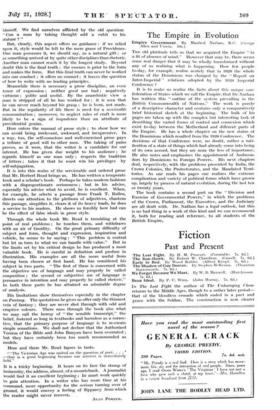The Empire in Evolution Empire Government. By Manfred Nathan, K.C.
(Ceorgo Allen and Unwin. 10s.) TIIE old platitude tells us that we acquired the Empire " in a fit of absence of mind." However that may be, there seems some real danger that it may be wholly transformed without any of us realizing what is happening. How few people to-day, for example, realize acutely that in 1926 the whole status of the Dominions was changed by the " Report on Inter-Imperial " relations adopted by the 1926 Imperial Conference ?
It is to make us realize the facts about this unique con- federation of States which we call the Empire, that Dr. Nathan has written this " outline of the system prevailing in the British Commonwealth of Nations." The work is purely of a descriptive character and contains only a comparatively brief historical sketch at the beginning. The bulk of his pages arc taken up with the complex but interesting task of describing the varied forms of control and connexion which exist to-day between the Motherland and different parts of the Empire. He has a whole chapter on the new status of the Dominions which resulted from the 1926 Conference. The decisions of that Conference were, no doubt, rather a rati- fication of a state of things which had already come into being of its own accord, but they are none the less of importance. He also notes and emphasizes the appointment of Ambassa- dors by Dominions to Foreign Powers. His next chapters deal, respectively, with the problems presented by India, the Crown Colonies, the Protectorates, and the Mandated Terri- tories. As one reads his pages one realizes the extreme complication and variety of political forms which have grown up, largely by process of natural evolution, during the last ten or twenty years.
The book contains a second part on the " Division and Exercise of Governmental Powers," in which the problems of the Crown, Parliament, the Executive, and the Judiciary are all dealt with. Dr. Nathan has a legal outlook, but this is no bad thing in a work of this kind and we can recommend it, both for reading and reference, to all students of the British Empire.




















































 Previous page
Previous page